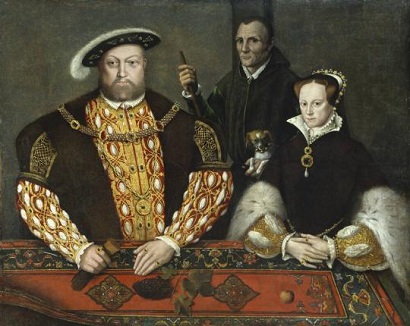~
How Come We Can’t Get Away From Anne Boleyn?
by Jeri Westerson
Anne, Anne, Anne. Why is she so important to the story of Henry VIII (who had four more wives after her)? And why is she important to my newly released novel Courting Dragons: A King’s Fool Mystery?
Let’s back up a bit to Prince Arthur Tudor. He was the elder brother to Henry VIII, slated to be King Arthur. Way back in 1497 he was betrothed—by proxy—to one Catherine of Aragon of Spain. The reason it was by proxy was because he and his betrothed were too young, but a treaty between England and Spain was desired by monarchs of both countries and so the kids were connected early on. They even had a wedding by proxy because they didn’t meet until October of 1501 when it was deemed they were finally old enough to get married in the flesh.
The deed was done and not long thereafter, Arthur fell ill. In fact, he died short of his sixteenth birthday.
Now enter the young Henry. Suddenly, he’s heir to the throne. And elder King Henry didn’t want all that dowry money to go back to Spain so he insisted on young Henry marrying his sister-in-law. But when Henry turned 14 he said no!

In 1509 at the ripe old age of eighteen, Henry succeeded to the throne of England. And he looked at his accounting books and decided that thousands of pounds worth of dowry was probably a good thing to have when starting a reign, not to mention keeping the Spanish treaties intact. But this was his brother’s widow. Didn’t he need papal dispensation to marry her? It’s just a little bit incesty. But the pope said no problem. You only need a dispensation if the marriage was consummated, and Catherine swore devoutly that it was not. She and Arthur were 15 years old and married for twenty weeks but didn’t consummate their legal marriage. Well...
“There is no more lovely, friendly and charming a relationship, communion or company than a good marriage.”
–Martin Luther, 1569
–Martin Luther, 1569
Henry and Catherine were happy in the beginning. It turned sour some twenty years later. She gave birth to a stillborn girl, then she gave birth to a boy, Henry, but he died after seven weeks. Then she gave birth to the Princess Mary (who was to become Queen Mary I, otherwise known as “Bloody Mary”). During this time, Henry was catting around with all sorts of women. But he was also a devout* Catholic (*can you really be devout when you’re constantly breaking one of the Ten Commandments?) So much so that in 1521 he wrote his “Defense of the Seven Sacraments” a direct argument against the protestant reforms of Martin Luther. Pope Leo X named Henry “Defender of the Faith” for that bestseller.
But by 1525, Henry was getting impatient for a legitimate male heir and certain courtiers were beginning to whisper in his ear—courtiers like Cardinal Wolsey and his secretary the commoner Thomas Cromwell. Leviticus 20:21 says that “if a man shall take his brother’s wife it is an unclean thing: they shall be childless.” Though Henry was far from childless, he preferred to interpret the text to mean “sonless” (though he had several illegitimate sons too). On this basis, Wolsey sought an annulment. The pope said nope.

Henry was getting all excited that this would work, that he could divorce his wife and marry—wait for it—Anne Boleyn, with whom he had been carrying on a chaste affair after having a not-so-chaste affair with Anne’s sister Mary (talk about incesty) who gave birth to yet another dead child, but possibly another not dead child that Henry would never acknowledge. He got pretty pissed off with Wolsey, trumped up some charges, had him arrested, even though Wolsey—as a bribe—handed over his just-finished manor house estate (that became Hampton Court) and was ready to put him on trial when he had the decency to die before that. Now Cromwell moved up and still had the king’s ear.
“The less prudent the prince the more his deeds oppress.” –Proverbs 28:16
.jpg) |
| Will Somers, close-up detail |
Henry’s taking over the province of the Church in England meant that he could get rid of all those corrupted and wealthy monasteries where all that expensive land was just sitting there when instead it could be sold and the revenue could fill his coffers. And so that’s what he did. Cromwell was in charge of collecting officers with the cover story that they were inspecting the monasteries to root out corruption…but while they were there, they took an inventory of all the goods, too. Ya know, just to keep an inventory.
So why is it that Anne’s story endures over the other five wives?
Anne’s end is tragic. True, she was quite the coquette as an up-and-comer in court. She was affianced at least twice, carried on with a married man, but was still chaste for the marriage bed, or so it was said. But by 1536, with only three years of marriage to her, Henry wanted out of the marriage that wasn’t giving him sons, and so Thomas Cromwell, Wolsey’s old assistant, devised her downfall, not giving her merely ONE paramour, but several, including her brother, just to add that last nail to the coffin. And this is what makes her endure. It was very clear to the people of the time—despite the fact that she usurped a very well-liked queen—that she was not guilty. Lancelot de Carles, French poet, wrote in 1536, “No one to look at her would have thought her guilty” as she “protested she had never misconducted herself towards the King.” “The queen exhibited such constancy, patience, and faith towards God that all the spectators, even her enemies, and those persons who previously had rejoiced at her misfortunes…testified and proclaimed her innocence and chastity.”
Wrongly accused, wrongly executed, Anne lives on as the ultimate sacrifice to Henry’s frenzied need for a male heir.
And, of course, she gave birth to England’s greatest monarch, Elizabeth I.
 |
| Posthumous portrait of Henry VIII with Queen Mary, with Will Somers and dog in center |
And that’s how Anne Boleyn becomes a part of my story, the background of Will Somers’s story, jester to King Henry, and investigating some pesky murders.
~
Jeri Westerson is the author of the new King’s Fool Mysteries with the reluctant sleuth Will Somers, Henry VIII’s real court jester, solving mysteries and murder at the Tudor court. She is also the author of the upcoming Sherlockian series An Irregular Detective Mystery, the multi-award-nominated Crispin Guest Medieval Noir series, paranormal books, including a gaslamp-steampunk fantasy the Enchanter Chronicles Trilogy, standalone historicals, and an LGBTQ rom/com mystery series. See it all at JeriWesterson.com.










